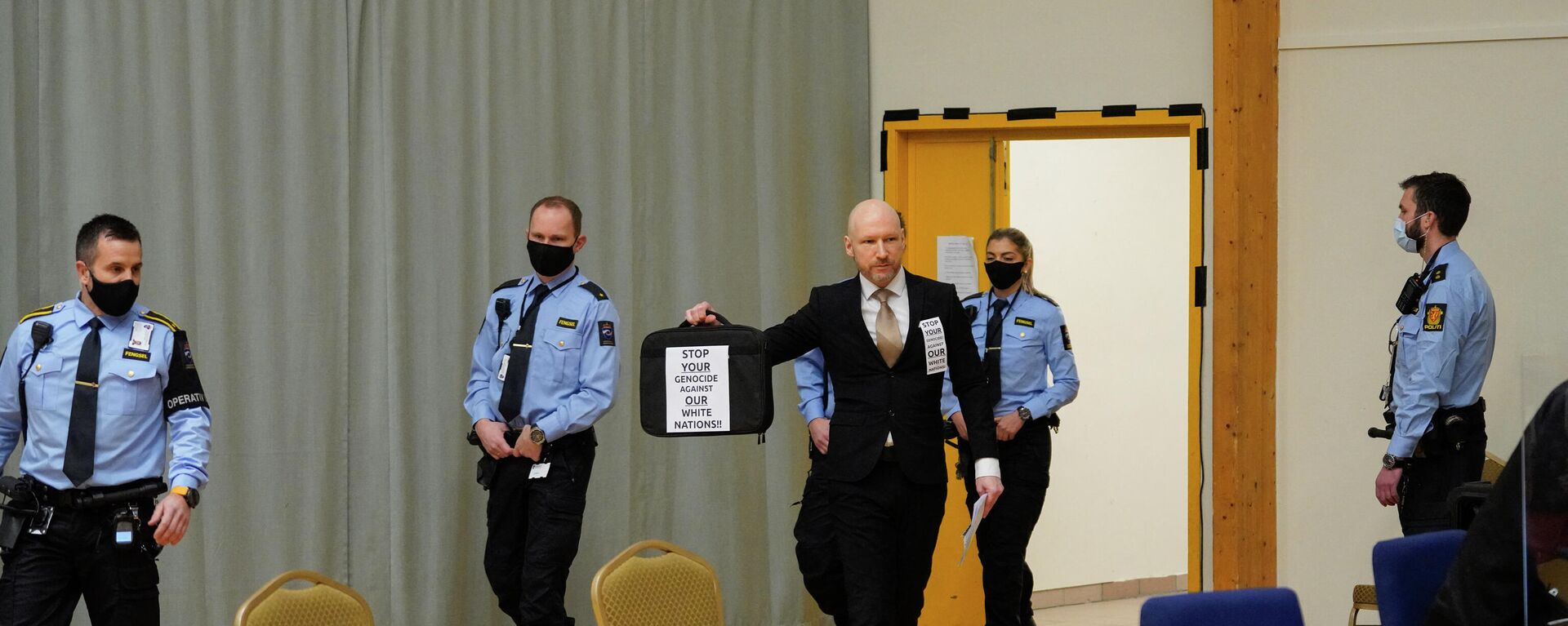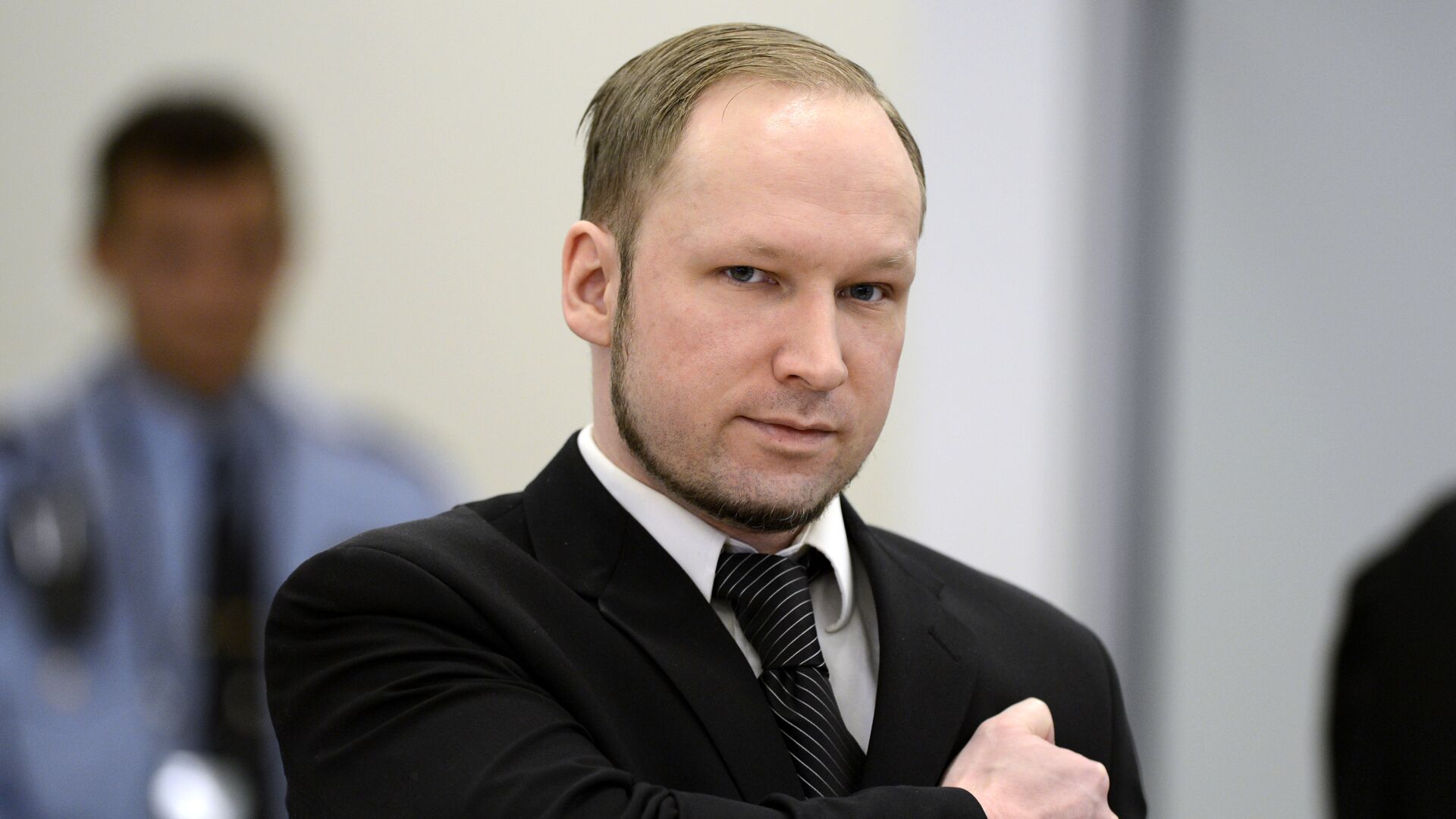https://sputnikglobe.com/20220119/psychiatrist-says-she-cannot-recommend-parole-of-norwegian-terrorist-breivik-1092373954.html
Psychiatrist Says She Cannot Recommend Parole of Norwegian Terrorist Breivik
Psychiatrist Says She Cannot Recommend Parole of Norwegian Terrorist Breivik
Sputnik International
MURMANSK (Sputnik) - Norwegian terrorist Anders Breivik, who was behind the attacks in Oslo and Utoya, is likely to pose a danger to society if released on... 19.01.2022, Sputnik International
2022-01-19T16:47+0000
2022-01-19T16:47+0000
2022-01-19T16:46+0000
anders breivik
norway
https://cdn1.img.sputnikglobe.com/img/17536/47/175364700_0:0:4928:2773_1920x0_80_0_0_23fa0101feebf7401e4f815d524fb157.jpg
"Statistically, the possibility of new acts of violence in the case of his parole is very high," the psychiatrist, who was a key witness in this hearing, said, as quoted by local television company NRK.Rosenqvist said that it was impossible to predict what Breivik would do if he were released from prison now."At any moment, he may decide that he is attracted to militaristic ideas again. He does not have a realistic understanding of his situation," the psychiatrist added.According to the psychiatrist, Breivik has traits of autism, with a personality type that can be described as "antisocial and narcissistic."In July 2011, Breivik detonated a bomb in Oslo, killing eight, and shortly thereafter carried out a mass shooting at a youth camp in Utoya, killing 69. He was sentenced to 21 years in prison, which is the maximum prison term in Norway.Soon after his arrest in 2011, Breivik acknowledged committing the attacks but did not plead guilty. At a parole hearing on Tuesday, he argued that internet radicalisation was responsible for the attacks.The court will decide on Thursday whether to grant Breivik parole.Under Norwegian law, a prisoner has the right to apply for parole after 10 years of imprisonment. If a person has served the maximum sentence and is still considered dangerous, a court can extend the sentence by five years at a time.
https://sputnikglobe.com/20220118/breivik-places-blame-for-2011-terrorist-attacks-on-neo-nazi-network-1092349528.html
norway
Sputnik International
feedback@sputniknews.com
+74956456601
MIA „Rossiya Segodnya“
2022
Sputnik International
feedback@sputniknews.com
+74956456601
MIA „Rossiya Segodnya“
News
en_EN
Sputnik International
feedback@sputniknews.com
+74956456601
MIA „Rossiya Segodnya“
Sputnik International
feedback@sputniknews.com
+74956456601
MIA „Rossiya Segodnya“
anders breivik, norway
Psychiatrist Says She Cannot Recommend Parole of Norwegian Terrorist Breivik
MURMANSK (Sputnik) - Norwegian terrorist Anders Breivik, who was behind the attacks in Oslo and Utoya, is likely to pose a danger to society if released on parole, psychiatrist Randi Rosenqvist said at Breivik's parole hearing.
"Statistically, the possibility of new acts of violence in the case of his parole is very high," the psychiatrist, who was a key witness in this hearing, said, as quoted by local television company NRK.
Rosenqvist said that it was impossible to predict what Breivik would do if he were released from prison now.
"At any moment, he may decide that he is attracted to militaristic ideas again. He does not have a realistic understanding of his situation," the psychiatrist added.
According to the psychiatrist, Breivik has traits of autism, with a personality type that can be described as "antisocial and narcissistic."

18 January 2022, 18:49 GMT
In July 2011, Breivik detonated a bomb in Oslo, killing eight, and shortly thereafter carried out a mass shooting at a youth camp in Utoya, killing 69. He was sentenced to 21 years in prison, which is the maximum prison term in Norway.
Soon after his arrest in 2011, Breivik acknowledged committing the attacks but did not plead guilty. At a parole hearing on Tuesday, he argued that internet radicalisation was responsible for the attacks.
The court will decide on Thursday whether to grant Breivik parole.
Under Norwegian law, a prisoner has the right to apply for parole after 10 years of imprisonment. If a person has served the maximum sentence and is still considered dangerous, a court can extend the sentence by five years at a time.


